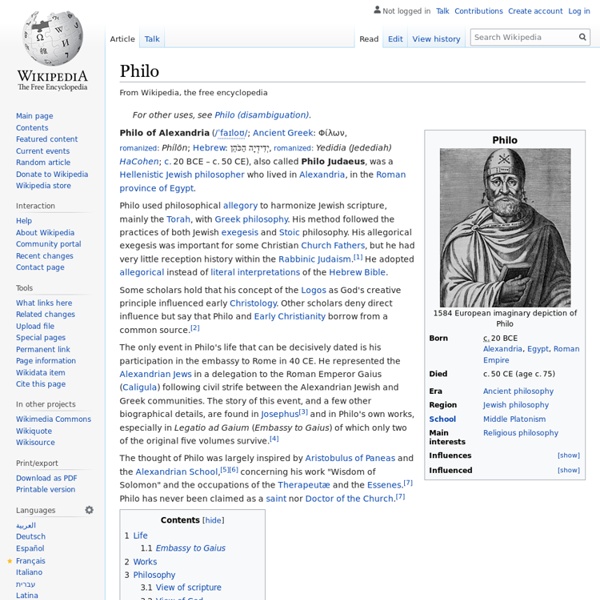William Penn
William Penn (October 14, 1644 – July 30, 1718) was the son of Sir William Penn, and was an English nobleman, writer, early Quaker, and founder of the English North American colony the Province of Pennsylvania. He was an early advocate of democracy and religious freedom, notable for his good relations and successful treaties with the Lenape Native Americans. Under his direction, the city of Philadelphia was planned and developed.
Cyrano de Bergerac
Hercule-Savinien de Cyrano de Bergerac (6 March 1619 – 28 July 1655) was a French dramatist and duelist . In fictional works about his life he is featured with an overly large nose, which people would travel from miles around to see. Portraits suggest that he did have a big nose, though not nearly as large as described in works about him.
Buddha's Logic
Theodor Ippolitovich Stcherbatsky (1866-1942) was a Russian scholar of Oriental Studies, and specifically a world renown (during his lifetime) specialist of Buddhist studies. To him is attributed: He journeyed, and his scholarly work and its publications saw Stcherbatsky regarded by many scholars in the west and in the east, as the leading figure in world Buddhology. He made a detailed study of the emergence of Buddhist thought in India, and specifically a detailed analysis of Vasubandu's Abhidharmokosha.
Gaius Cassius Longinus
Roman senator, assassin of Caesar Gaius Cassius Longinus (Classical Latin: [ˈɡaːɪ.ʊs ˈkassɪ.ʊs ˈlɔŋɡɪnʊs]; 3 October, before 85 BC – 3 October 42 BC), often referred to as Cassius, was a Roman senator and general best known as a leading instigator of the plot to assassinate Julius Caesar on March 15, 44 BC.[1][2][3] He was the brother-in-law of Brutus, another leader of the conspiracy. He commanded troops with Brutus during the Battle of Philippi against the combined forces of Mark Antony and Octavian, Caesar's former supporters, and committed suicide after being defeated by Mark Antony. Cassius was elected as a Tribune of the Plebs in 49 BC. He opposed Caesar, and eventually he commanded a fleet against him during Caesar's Civil War: after Caesar defeated Pompey in the Battle of Pharsalus, Caesar overtook Cassius and forced him to surrender.
Platonism and Theism
This article explores the compatibility of, and relationship between, the Platonic and Theistic metaphysical visions. According to Platonism, there is a realm of necessarily existing abstract objects comprising a framework of reality beyond the material world. Platonism argues these abstract objects do not originate with creative divine activity. Traditional Theism contends that God is primarily the creator and that God is the source of existence for all realities beyond himself, including the realm of abstract objects. A primary obstacle between these two perspectives centers upon the origin, nature and existence of abstract objects. The Platonist contends that these abstract objects exist as a part of the framework of reality and that abstract objects are, by nature, necessary, eternal and uncreated.
Brutus the Younger
Roman politician Brutus was close to General Julius Caesar, the leader of the Populares faction. However, Caesar's attempts to assume greater power for himself put him at greater odds with the Roman elite and members of the Senate. Brutus eventually came to oppose Caesar and fought on the side of the Optimates faction, led by Pompey the Great, against Caesar's forces in Caesar's Civil War.
Platonism, Mathematical
Mathematical platonism is any metaphysical account of mathematics that implies mathematical entities exist, that they are abstract, and that they are independent of all our rational activities. For example, a platonist might assert that the number pi exists outside of space and time and has the characteristics it does regardless of any mental or physical activities of human beings. Mathematical platonists are often called "realists," although, strictly speaking, there can be realists who are not platonists because they do not accept the platonist requirement that mathematical entities be abstract. Mathematical platonism enjoys widespread support and is frequently considered the default metaphysical position with respect to mathematics.
Apuleius
Apuleius (/ˌæpjʉˈliːəs/; also called Lucius Apuleius Madaurensis; Berber: Afulay;[1] c. 125 – c. 180 CE) was a Latin-language prose writer. He was a Numidian Berber and lived under the Roman Empire.[2] He was from Madaurus (now M'Daourouch, Algeria). He studied Platonist philosophy in Athens; travelled to Italy, Asia Minor and Egypt; and was an initiate in several cults or mysteries. The most famous incident in his life was when he was accused of using magic to gain the attentions (and fortune) of a wealthy widow. He declaimed and then distributed a witty tour de force in his own defense before the proconsul and a court of magistrates convened in Sabratha, near ancient Tripoli, Libya.
Platonism in the Philosophy of Mathematics
1. What is Mathematical Platonism? Mathematical platonism can be defined as the conjunction of the following three theses:
Saint Sebastian
3rd-century Christian saint and martyr Saint Sebastian (died c. AD 288) was an early Christian saint and martyr.
Platonism in Metaphysics
1. What is Platonism? Platonism is the view that there exist abstract (that is, non-spatial, non-temporal) objects (see the entry on abstract objects). Because abstract objects are wholly non-spatiotemporal, it follows that they are also entirely non-physical (they do not exist in the physical world and are not made of physical stuff) and non-mental (they are not minds or ideas in minds; they are not disembodied souls, or Gods, or anything else along these lines). In addition, they are unchanging and entirely causally inert — that is, they cannot be involved in cause-and-effect relationships with other objects.[1] All of this might be somewhat perplexing; for with all of these statements about what abstract objects are not, it might be unclear what they are. We can clarify things, however, by looking at some examples.



